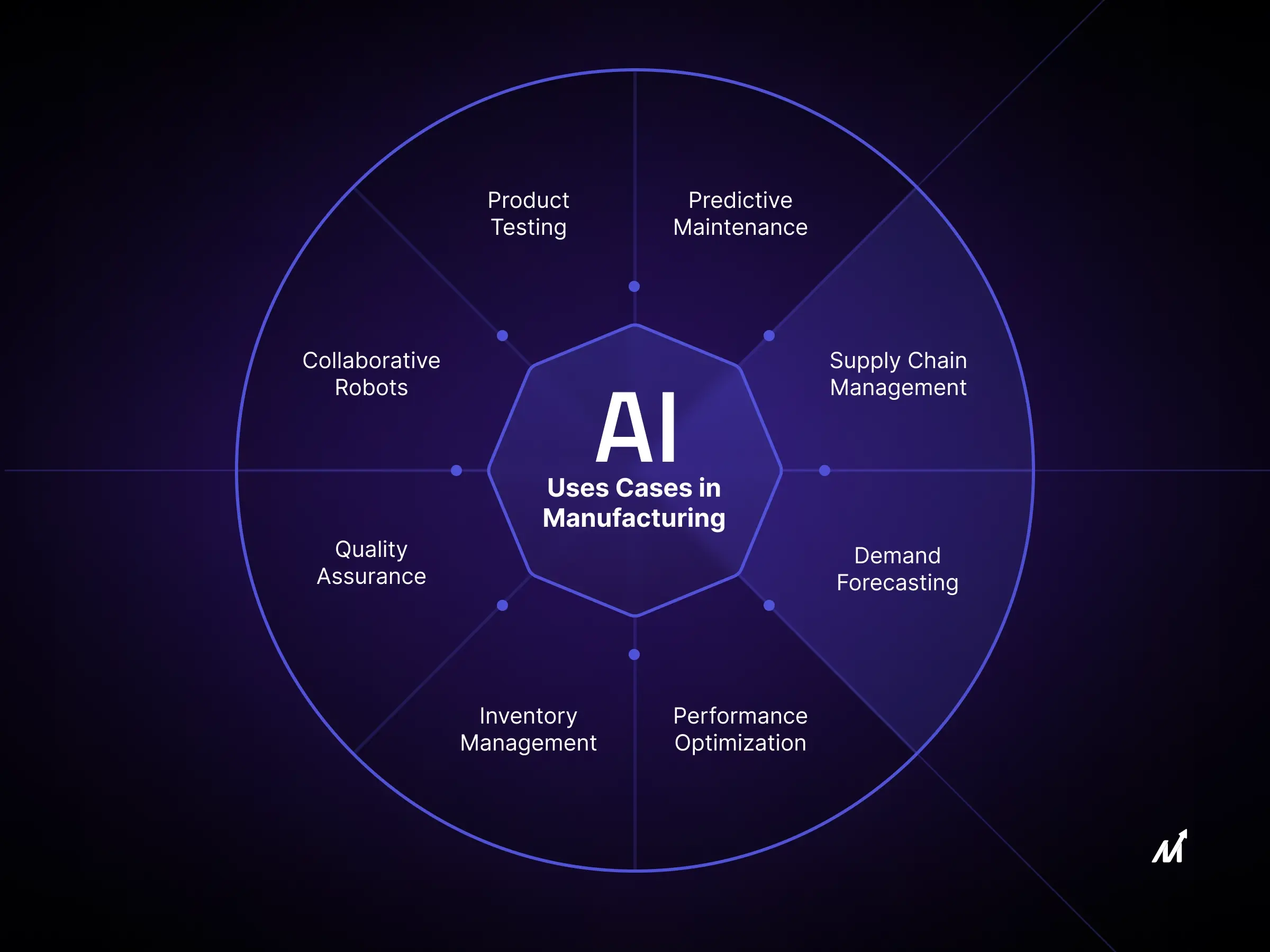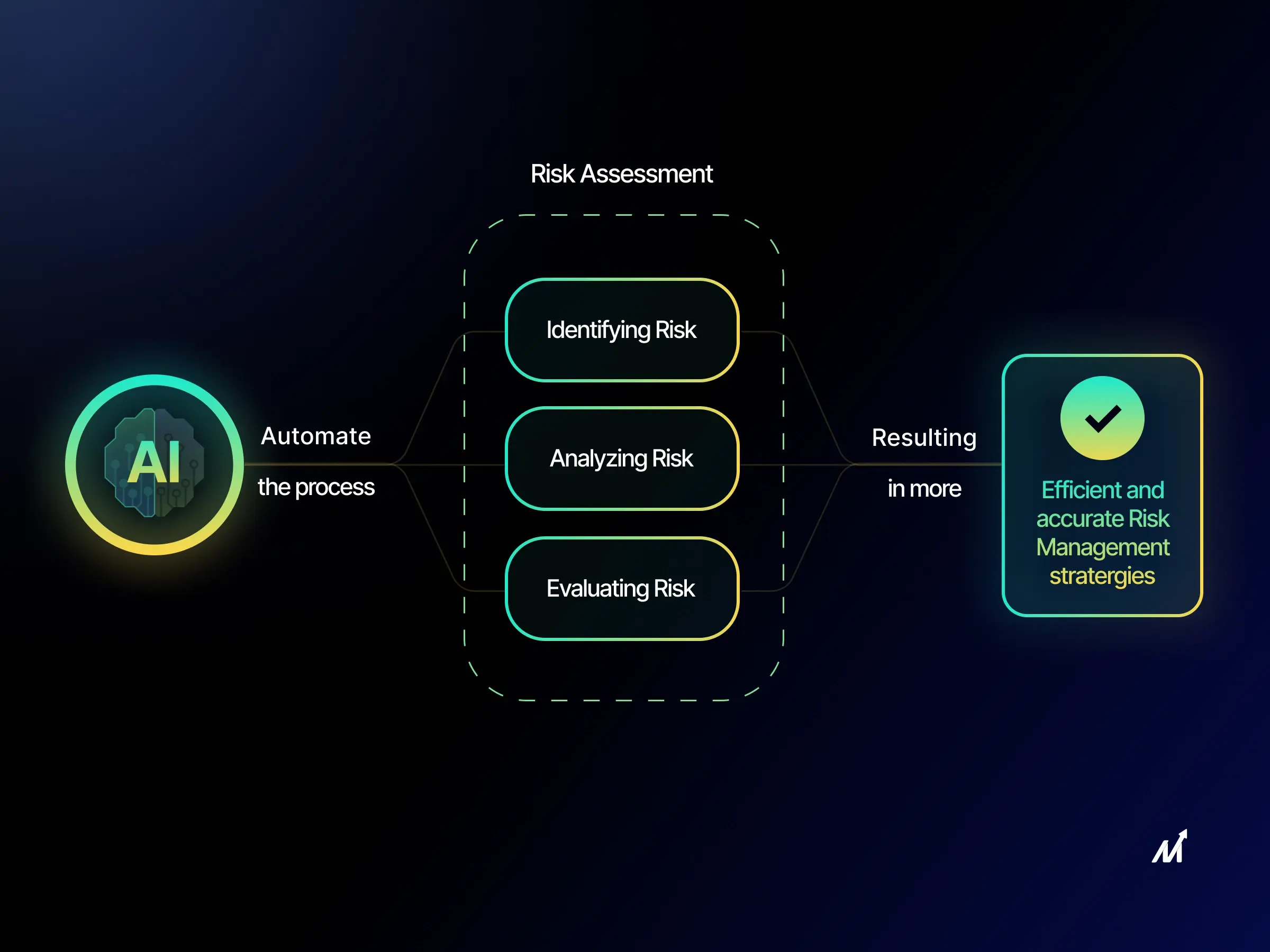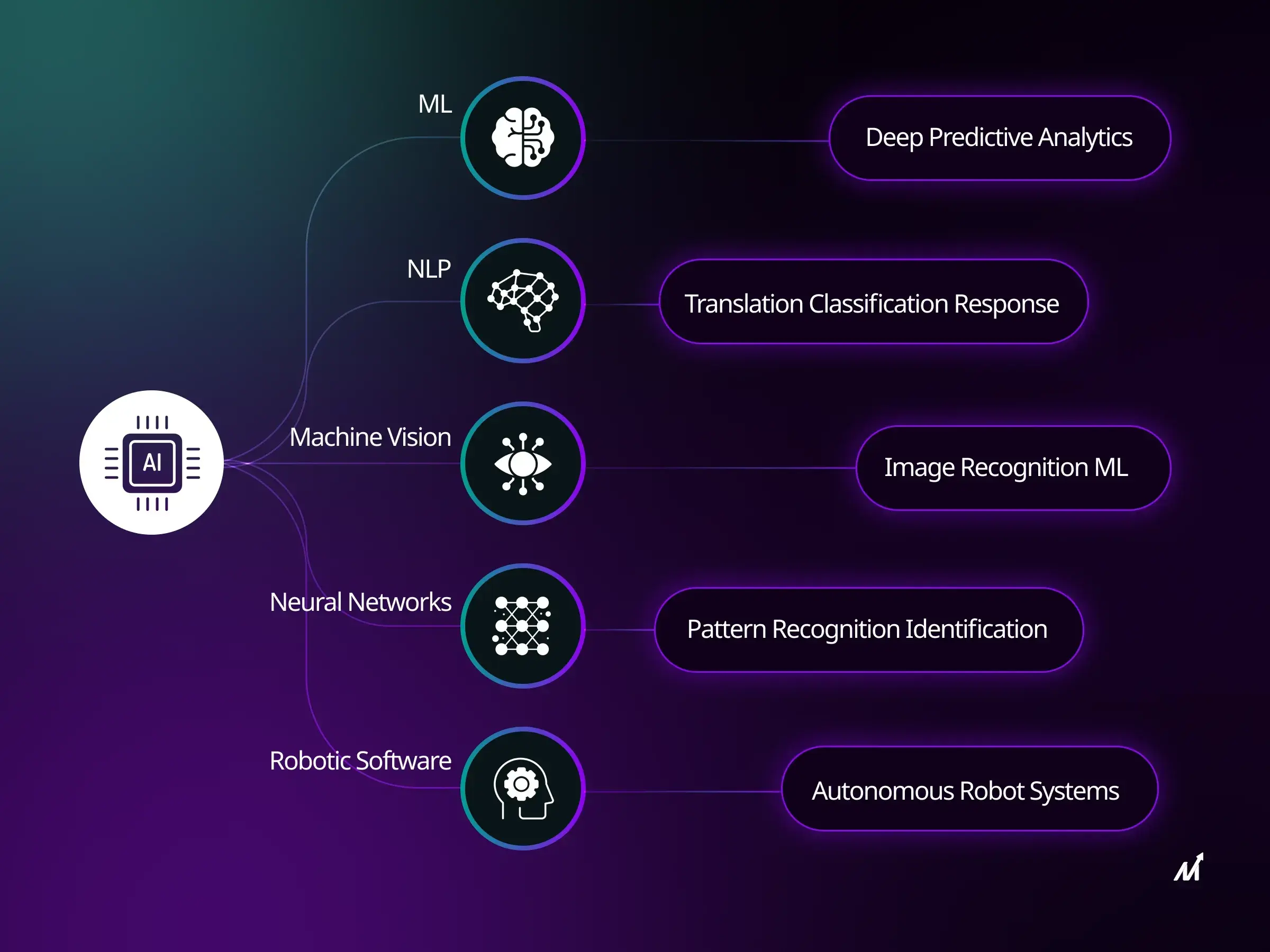The manufacturing industry has long been a beacon of innovation, continuously evolving to meet the demands of modern production. However, the advent of artificial intelligence (AI) is propelling this sector into unprecedented realms of efficiency and capability.
As an expert in the manufacturing industry, I’ve seen firsthand how AI solutions are transforming the sector. From predictive maintenance to quality control, AI applications are revolutionizing manufacturing processes and improving operational efficiency across the board.
AI Use Cases in the Manufacturing Industry
One of the most exciting AI use cases in manufacturing is predictive maintenance. By leveraging machine learning algorithms and sensor data, manufacturers can now predict when equipment is likely to fail, allowing them to schedule maintenance proactively and avoid costly downtime. AI-powered predictive maintenance can reduce unplanned downtime by up to 50% and increase equipment availability by 10-20%.
Generative AI is another exciting area of AI that is transforming the manufacturing industry. This technology uses machine learning algorithms to generate new designs and optimize existing ones, enabling manufacturers to create more innovative and efficient products.
AI is revolutionizing manufacturing processes from the shop floor to the entire supply chain, creating a transformative impact on production methodologies. The numbers speak for themselves: by 2027, the AI market within the manufacturing industry is projected to reach an impressive $10.07 billion. But what does that look like in practice? In this post, we’ll explore game-changing AI use cases reshaping manufacturing as we know it. Get ready to see how AI is making production smarter, faster, and more efficient than ever before.
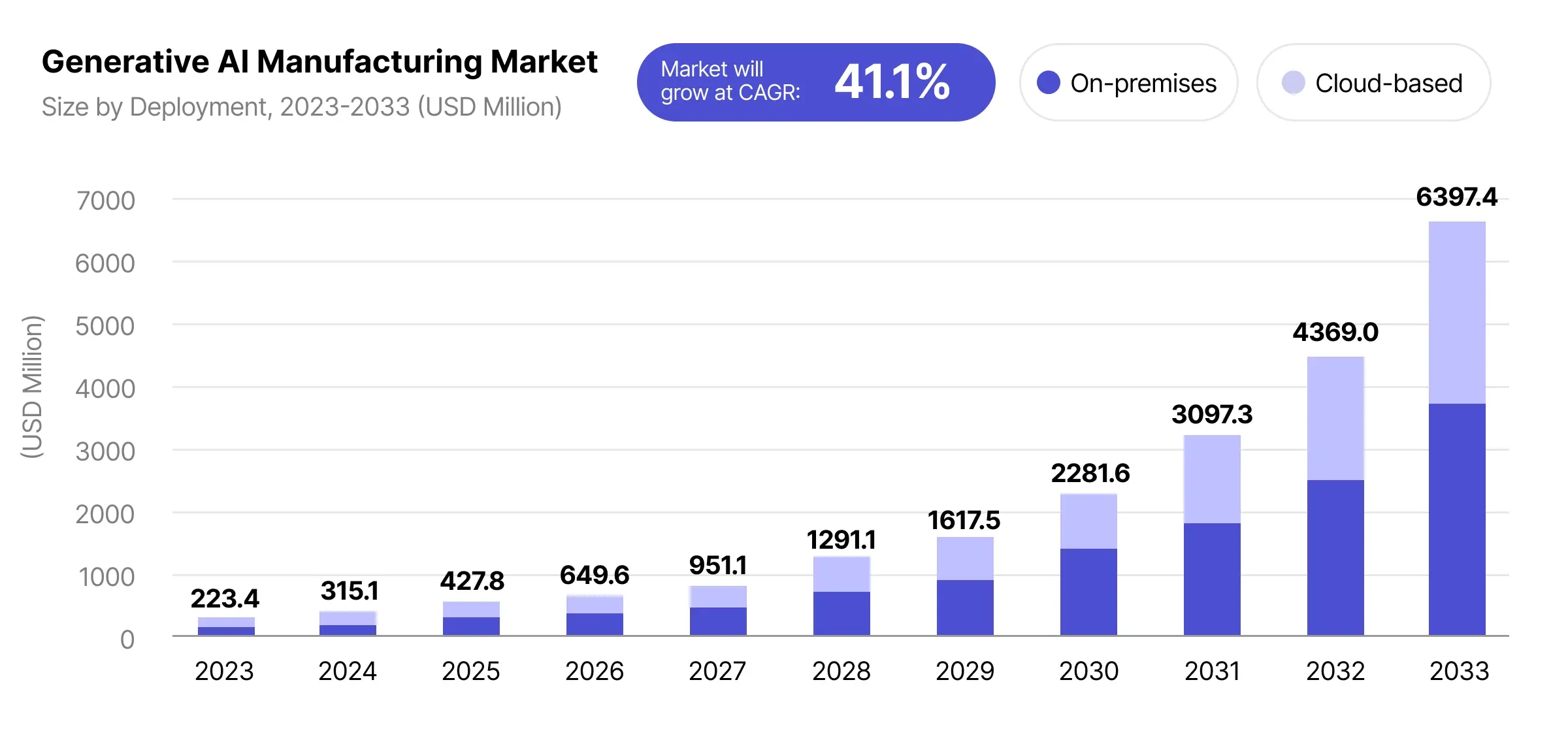
1. Production Process Optimization
Generative AI can optimize manufacturing production processes. By analyzing historical process data and simulating different scenarios, generative AI can identify optimal process settings that improve efficiency, reduce waste, and enhance product quality. It can help manufacturers streamline operations and reduce costs while improving overall performance.
A leading automotive manufacturer used generative AI to revolutionize car design. By inputting parameters such as material strength, weight, and safety requirements, the AI algorithm generated multiple design alternatives that were lighter and stronger than traditional designs. This led to the production of more fuel-efficient vehicles with enhanced safety features, setting new standards in automotive design innovation.
2. Additive Manufacturing
Additive manufacturing, also known as 3D printing, is another area where generative AI is making a significant impact. By automatically generating optimal part designs and print parameters based on desired performance characteristics and material properties, generative AI can reduce the time and cost of additive manufacturing while improving part quality and performance. This use case of AI is a game-changer for manufacturers looking to leverage the benefits of additive manufacturing in their operations.
An aerospace manufacturer utilized generative AI to enhance their additive manufacturing process for aircraft components. The AI-generated designs minimized material usage while maintaining structural integrity, leading to a 20% reduction in material costs and a 30% decrease in production time. The performance of the aerospace parts improved by 25%, contributing to higher fuel efficiency and durability of the aircraft.
AI-powered robotics and automation are transforming the manufacturing industry. They enable manufacturers to improve efficiency, reduce costs, and enhance product quality. From collaborative robots to machine vision systems, these technologies are revolutionizing the way manufacturers operate.
3. Collaborative Robots (Cobots)

Collaborative robots, or cobots, are designed to work safely alongside human workers on assembly lines and in other manufacturing environments. By using AI and machine vision, cobots can adapt to changing tasks and environments, reducing the need for manual programming and increasing flexibility in manufacturing operations. It can be a success for manufacturers looking to improve efficiency and reduce time while ensuring the safety of their human workers.
A major electronics manufacturer deployed cobots on their assembly line, increasing production efficiency by 30%. The cobots, using AI and machine vision, adapted to different product models without extensive reprogramming, resulting in a 25% reduction in setup time for new product lines. Worker safety incidents decreased by 40%, while overall production time was reduced by 20%.
4. Machine Vision for Quality Inspection
Machine vision is another powerful AI technology transforming quality inspection in manufacturing. By using deep learning algorithms and high-resolution cameras, machine vision systems can automatically detect defects and anomalies in products and components, improving inspection accuracy and speed. This AI use case can help manufacturers identify quality issues that are difficult or impossible for human workers to detect, reducing the risk of product recalls and improving overall quality.
A pharmaceutical manufacturer company implemented machine vision systems equipped with deep learning algorithms to inspect their packaging line. The AI-powered system automatically detected defects in labels, seals, and packaging integrity at a speed and accuracy unattainable by human inspectors. This reduced the risk of defective products reaching consumers and minimized costly recalls, ensuring high-quality standards.
5. Automated Material Handling
AI-powered automated material handling systems are also transforming the manufacturing industry. By using machine learning algorithms and robotics, these systems can optimize the routing and scheduling of raw materials, reduce the risk of errors and accidents, and improve overall throughput and productivity. AI is helping manufacturers looking to streamline their operations and reduce costs while improving efficiency and safety.
In the food and beverage industry, an AI-powered automated material handling system optimized the transportation and storage of raw materials. The system’s optimization algorithms improved routing efficiency by 25% and reduced errors by 15%. This enhancement increased overall throughput by 20% and reduced downtime by 18%, ensuring timely delivery of raw materials to production lines.
AI is also transforming supply chain and logistics optimization in the manufacturing industry. From demand forecasting and planning to inventory optimization and supplier risk assessment, AI is enabling manufacturers to make more informed decisions and improve their overall performance.
6. Demand Forecasting and Planning
Demand forecasting and planning are critical areas in which AI is significantly impacting manufacturing. By analyzing historical sales data, market trends, and external factors such as weather and economic indicators, AI-powered demand forecasting tools can generate more accurate predictions, enabling manufacturers to better plan production and inventory levels. This application can help manufacturers reduce costs, improve efficiency, and enhance customer satisfaction.
An apparel manufacturer used AI-powered demand forecasting tools to analyze historical sales data and market trends. The AI provided demand predictions with 95% accuracy, enabling more effective production and inventory planning. This reduced excess stock by 20% and stockouts by 25%, leading to a 15% improvement in customer satisfaction and a 10% increase in sales.
7. Inventory Optimization
Inventory optimization is another area where AI is transforming the manufacturing industry. By analyzing historical data and real-time demand signals, AI-based inventory optimization tools can predict optimal inventory levels and automate replenishment processes, reducing the risk of stockouts and overstocking. Manufacturers can reduce inventory costs and improve inventory turns, leading to significant cost savings and improved operational efficiency.
A consumer electronics company implemented AI-based inventory optimization tools, resulting in a 20% reduction in inventory holding costs. The AI predicted optimal inventory levels with 98% accuracy and automated replenishment processes, reducing stockouts by 30% and overstocking by 25%. This led to a 15% increase in inventory turnover and significant cost savings.
8. Supplier Risk Assessment
Finally, AI is also transforming supplier risk assessment in the manufacturing industry. AI-powered supplier risk assessment tools can identify potential risks such as economic instability, geopolitical events, and natural disasters by analyzing data from multiple sources, including financial reports, news articles, and social media. AI can help manufacturers proactively address issues before they impact operations, reducing the risk of supply chain disruptions and improving overall performance.
An automotive manufacturer adopted AI-powered supplier risk assessment tools to monitor and evaluate supplier risks. The AI identified potential risks with 90% accuracy, such as supplier financial instability and geopolitical events. This proactive approach allowed the manufacturer to mitigate risks before they impacted operations, reducing supply chain disruptions by 25% and ensuring a more reliable supply chain.
Key Takeaway:
AI is revolutionizing manufacturing with predictive maintenance, quality control, supply chain optimization, inventory management, demand forecasting, generative design, production process optimization, additive manufacturing improvements, AI-powered robotics, and automation, including cobots and machine vision for inspection. These innovations streamline operations while boosting efficiency and product quality.
Predictive analytics is a game-changer in the world of manufacturing. By leveraging the power of machine learning algorithms and historical data, manufacturers can now anticipate potential issues before they occur. This proactive approach not only saves time and money but also ensures a smoother, more efficient production process.
9. Equipment Failure Prediction
Equipment failure prediction is one of the most significant applications of predictive analytics in manufacturing. By analyzing sensor data and machine performance metrics, AI algorithms can identify patterns and anomalies that indicate a potential breakdown. This AI application allows maintenance teams to schedule repairs or replacements before the equipment fails, minimizing downtime and maximizing productivity.
For example, a leading automotive manufacturer implemented an AI-powered predictive maintenance system and saw a 20% reduction in unplanned downtime. By predicting and preventing equipment failures, they optimized their production process and improved overall operational efficiency.
10. Production Quality Optimization
Manufacturers can use predictive analytics to optimize production quality. By analyzing data from various stages of the manufacturing process, AI algorithms can identify factors that contribute to quality issues. AI allows manufacturers to make data-driven decisions and implement corrective actions to improve product quality.
A real-world example of this is a global electronics manufacturer that used predictive analytics to reduce defect rates by 50%. By identifying the root causes of quality issues and making targeted improvements, they were able to significantly enhance their manufacturing processes and deliver higher-quality products to their customers.
11. Process Parameter Optimization
Predictive analytics can also help manufacturers optimize process parameters. By analyzing historical process data and identifying the optimal settings for each stage of production, AI algorithms can help manufacturers fine-tune their processes for maximum efficiency and quality.
A leading chemical manufacturer used predictive analytics to optimize their batch production process, resulting in a 15% increase in yield and a 20% reduction in energy consumption. By leveraging the power of data and AI, they were able to streamline their operations and achieve significant cost savings.
Digital twins and simulation are:
- Powerful tools in the manufacturing industry.
- Allowing companies to create virtual replicas of their products and processes.
- Even entire factories.
When combined with AI, these technologies offer unprecedented opportunities for optimization and innovation.
12. Virtual Product Testing and Validation
One of the most exciting applications of AI in digital twins is virtual product testing and validation. By creating a digital replica of a product and subjecting it to various simulated conditions, manufacturers can identify potential issues and optimize designs before making a physical prototype. This approach saves time and money and allows for more iterative and innovative product development.
For example, a leading aerospace manufacturer used AI-powered digital twins to simulate and optimize the design of a new aircraft engine. By running thousands of virtual tests and analyzing the results with AI, they identified the optimal design parameters and reduced development time by 50%.
13. Production Line Simulation
Enterprises can use AI-powered digital twins to simulate and optimize production lines. By creating a virtual replica of a factory floor and using AI to analyze various scenarios, manufacturers can identify bottlenecks, optimize layouts, and test new configurations without disrupting actual production.
A global automotive manufacturer used AI-driven production line simulation to optimize their assembly process, resulting in a 30% increase in throughput and a 20% reduction in cycle time. By leveraging the power of digital twins and AI, they were able to make data-driven decisions and continuously improve their manufacturing operations.
Quality control and inspection are critical aspects of the manufacturing process, ensuring that products meet the required standards and specifications. AI is revolutionizing this area, offering new ways to automate and optimize quality control processes.
14. Automated Visual Inspection
One of the most promising applications of AI in quality control is automated visual inspection. By using machine vision and deep learning algorithms, manufacturers can automate the process of identifying defects and anomalies in products. This not only saves time and reduces the risk of human error but also allows for more consistent and accurate product inspection.
A leading electronics manufacturer implemented an AI-powered visual inspection system and saw a 90% reduction in false positives and a 50% increase in defect detection accuracy. By leveraging AI, they improved product quality and reduced the costs associated with manual inspections
15. Defect Detection and Classification
AI can also be used to detect and classify defects in products automatically. By training machine learning models on vast datasets of defective and non-defective products, manufacturers can create systems that can quickly and accurately identify issues and categorize them based on severity and type.
A global automotive supplier used AI to detect and classify defects in their injection-molded parts, resulting in a 75% reduction in scrap rates and a 50% increase in production efficiency. By leveraging the power of AI, they improved product quality and reduced waste, ultimately saving time and money.
16. Predictive Quality Analytics
AI can also be used to predict potential quality issues before they occur. By analyzing data from various stages of the manufacturing process and using machine learning algorithms to identify patterns and anomalies, manufacturers can proactively address potential issues and prevent defects from occurring in the first place.
A leading pharmaceutical manufacturer used predictive quality analytics to reduce batch failure rates by 30%. By identifying potential issues early in the production process and taking corrective actions, they improved product quality and reduced the costs associated with scrap and rework.
Implementing AI Solutions in Manufacturing
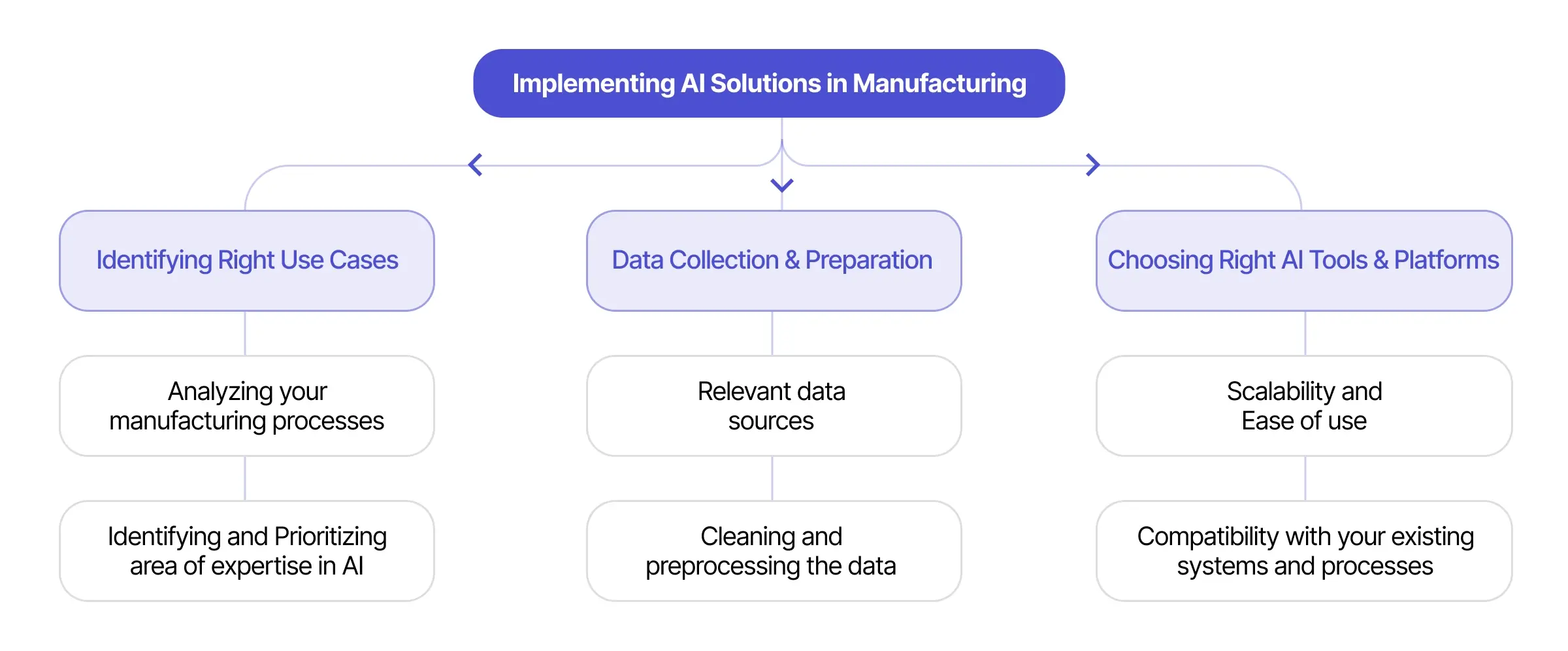
Implementing AI solutions in manufacturing can be complex and challenging, but the benefits are well worth the effort. It’s essential to approach the implementation process strategically and systematically.
Identifying the Right Use Cases
The first step in implementing AI in manufacturing is identifying the right use cases. It involves:
- Carefully analyze your manufacturing processes.
- Identifying areas where AI can have the most significant impact.
- Prioritizing those use cases based on their potential return on investment.
For example, a leading industrial equipment manufacturer identified predictive maintenance as a high-priority use case for AI. By implementing an AI-powered predictive maintenance system, they were able to reduce unplanned downtime by 25% and increase overall equipment effectiveness by 15%.
Data Collection and Preparation
Once you’ve identified the proper use cases, the next step is to collect and prepare the data needed to train and validate your AI models. This involves identifying the relevant data sources, cleaning and preprocessing the data, and ensuring that it’s in a format that your AI algorithms can easily consume.
Choosing the Right AI Tools and Platforms
Finally, it’s essential to choose the right AI tools and platforms to support your implementation efforts. This involves evaluating various options based on factors such as scalability, ease of use, and compatibility with your existing systems and processes.
A leading aerospace manufacturer chose a cloud-based AI platform to support their digital twin initiatives. By leveraging the scalability and flexibility of the cloud, they were able to quickly and easily create digital twins of their products and processes, enabling them to optimize designs, simulate performance, and accelerate innovation.
Implementing AI in manufacturing is a journey, but the benefits can be genuinely transformative with the right approach and tools. By leveraging the power of AI to optimize processes, improve quality, and drive innovation, manufacturers can stay ahead of the curve and thrive in an increasingly competitive landscape.
Key Takeaway:
Predictive analytics in manufacturing saves time and money by anticipating issues before they occur. This proactive approach ensures smoother, more efficient production.
Equipment Failure Prediction: AI analyzes sensor data to predict breakdowns, reducing downtime and boosting productivity.
Production Quality Optimization: AI helps identify quality issues early, leading to significant improvements in product quality.
Process Parameter Optimization: Fine-tune processes using historical data for maximum efficiency and cost savings.
How Markovate Can Help with Implementing AI in Manufacturing Businesses
Markovate specializes in implementing tailored AI solutions for the manufacturing industry, driving efficiency, productivity, and innovation. Our expertise includes building and implementing predictive maintenance systems that use AI to forecast equipment failures, reducing unplanned downtime by up to 20%. We develop generative design solutions to create innovative and efficient product designs and optimize production processes to improve yield rates and cut production costs.
Our AI-powered robotics and automation encompass automated material handling, machine vision for quality inspection, and collaborative robots (cobots) that enhance production efficiency and worker safety. We also build AI tools for demand forecasting and planning, ensuring accurate demand predictions for better production and inventory management, and implement inventory optimization systems that reduce stockouts and overstocking by 20-30%.
Additionally, we develop supplier risk assessment tools to help mitigate potential disruptions by analyzing financial reports, news, and social media. We ensure seamless AI integration with existing systems, scalable architecture, and robust data management, backed by comprehensive training, continuous support, and maintenance to maximize the benefits of AI in manufacturing.
FAQs about AI Use Cases in Manufacturing
How will AI integration impact my existing manufacturing processes?
AI integration with your existing systems is seamless, ensuring minimal disruption to your operations. The solutions we engineer are designed to enhance your current processes, providing immediate benefits such as reduced downtime, improved efficiency, better quality control, and optimized inventory management.
What kind of ROI can I expect from implementing AI solutions?
Implementing AI solutions with Markovate can lead to significant ROI, including a reduction in unplanned downtime, an increase in yield rates, a reduction in production costs, and an improvement in inventory management. These improvements translate to substantial cost savings and increased productivity.
How long does it take to implement an AI solution?
The implementation timeline for AI solutions varies based on the complexity of the project and specific business requirements. Generally, our projects can range from a few weeks for simpler solutions to several months for more complex integrations. During the AI consultation phase, we provide a detailed roadmap to ensure clear timelines and milestones.
How does Markovate ensure data security and compliance with AI solutions?
Data security and compliance are top priorities at Markovate. To protect your data, we implement robust data management practices and adhere to industry standards and regulations. Our solutions are designed to ensure data privacy and security throughout the AI lifecycle.
Can Markovate customize AI solutions to fit the unique needs of my manufacturing business?
Absolutely. We specialize in creating customized AI solutions that address the specific challenges and requirements of your manufacturing business. Our team works closely with you to develop and implement AI systems that align with your goals and deliver maximum value.
How do I get started with Markovate for AI implementation?
Getting started with Markovate is simple. Contact us for an initial consultation, during which we will discuss your business needs, assess your current processes, and outline a strategic roadmap for AI implementation. We will guide you through every step, from initial planning to full-scale deployment and beyond.
Conclusion
The future of manufacturing is here, and AI powers it. From predictive maintenance to generative design, these ten use cases showcase AI’s incredible potential to revolutionize the way we make things.
But this is just the beginning. As AI continues to evolve, we can expect to see even more innovative applications emerge, driving new levels of efficiency, quality, and customization.
The key to success will be embracing these technologies and integrating them into our manufacturing processes. By doing so, we can unlock new opportunities for growth, competitiveness, and customer satisfaction.
So, let’s keep exploring, experimenting, and pushing the boundaries of what’s possible with AI in manufacturing. The future is bright – and it’s waiting for us to shape it.

I’m Rajeev Sharma, Co-Founder and CEO of Markovate, an innovative digital product development firm with a focus on AI and Machine Learning. With over a decade in the field, I’ve led key projects for major players like AT&T and IBM, specializing in mobile app development, UX design, and end-to-end product creation. Armed with a Bachelor’s Degree in Computer Science and Scrum Alliance certifications, I continue to drive technological excellence in today’s fast-paced digital landscape.


